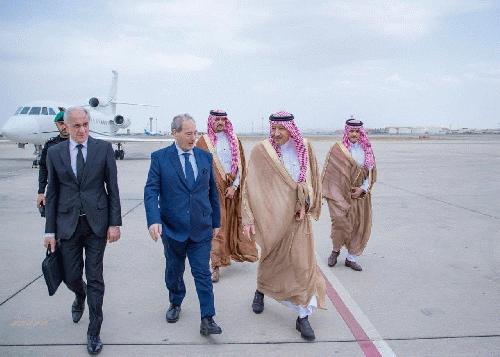In a first since 2011, Syrian Foreign Minister Faisal Mekdad arrived for a visit to Saudi Arabia, as ties between Damascus and Riyadh grow, and a restoration of relations between the two Arab countries becomes increasingly likely. Mekdad was invited by the Saudi foreign minister, Prince Faisal bin Farhan
But Saudi Arabia is facing pushback from some Arab states, including key allies, over plans to bring Syrian President Bashar al-Assad in from the cold. Saudi Arabia appears to be trying to mend ties with Syria ahead of the Arab League summit which the kingdom will host in May.
At least five members of the Arab League - including Morocco, Kuwait, Qatar, and Yemen - have refused to readmit Syria into the group, the Wall Street Journal reported.
The Syrian civil war is a complex and ongoing conflict that began in 2011. The conflict started with peaceful protests against the Syrian government led by President Bashar al-Assad, demanding more democratic freedoms and an end to government corruption. The government responded with violence, which escalated into a full-blown civil war involving multiple factions, including the Syrian government, opposition groups, and various extremist groups.
The conflict is complicated by various factors, including sectarianism, regional power struggles, and the involvement of foreign powers. The Syrian government is largely supported by Russia and Iran, while the opposition groups are supported by various regional and international powers, including Turkey, the United States, and various Gulf states.
The conflict has caused immense human suffering, including the displacement of millions of Syrians and the death of hundreds of thousands. The conflict has also had regional and international implications, with millions of refugees fleeing to neighboring countries and beyond, and with the involvement of various foreign powers, which has led to diplomatic tensions and geopolitical implications.
The conflict continues to this day, with intermittent ceasefires and attempts at peace negotiations. However, the situation remains volatile and the future of Syria remains uncertain.
Embracing Syria is a win for Iran for several reasons.Firstly, Iran sees Syria as an important ally in its regional power struggle with Saudi Arabia and other Gulf states. Syria is a key part of Iran's strategic alliance with the Lebanese Hezbollah group, which gives Iran significant influence in Lebanon and the wider region. By maintaining a close relationship with Syria, Iran can continue to expand its regional influence and push back against its rivals.
Secondly, Syria provides Iran with a critical link to the Mediterranean Sea, which is a vital route for Iranian oil exports. Iran has invested heavily in Syria's energy sector, and it uses Syrian ports to ship oil to its allies in the region. By maintaining a friendly government in Syria, Iran can ensure the security of its energy exports and protect its economic interests.
Thirdly, Iran sees Syria as an important front in its wider struggle against Israel and the United States. Syria has long been a supporter of Palestinian militant groups, and Iran sees Syria as a key ally in its efforts to challenge Israel's regional dominance. By supporting the Syrian government, Iran can continue to push back against Israel and its allies in the region, and maintain its position as a leading anti-Western power.
Egypt is wary of bringing Syria back into the Arab fold over fears of US sanctions.
The US is threatening sanctions if countries reestablish relations with Syria because it considers the Syrian government to be responsible for human rights abuses and atrocities committed during the ongoing civil war. The US, along with other Western countries, has long been critical of the Syrian government's use of chemical weapons, indiscriminate bombing of civilians, and other war crimes.
In 2011, the US and other countries imposed sanctions on Syria in response to the government's violent crackdown on peaceful protests. These sanctions have been strengthened over time and include measures that target the Syrian government and individuals and entities associated with it.
The US views the reestablishment of relations with the Syrian government as a legitimization of its actions and a signal that the international community is willing to overlook its human rights abuses. The US also sees the Syrian government as a close ally of Iran, which it considers to be a destabilizing force in the region.
By threatening sanctions, the US hopes to deter countries from establishing ties with Syria and send a message that it will not tolerate efforts to normalize relations with a government that it considers to be a violator of human rights and a threat to regional stability.
(Note: You can view every article as one long page if you sign up as an Advocate Member, or higher).





